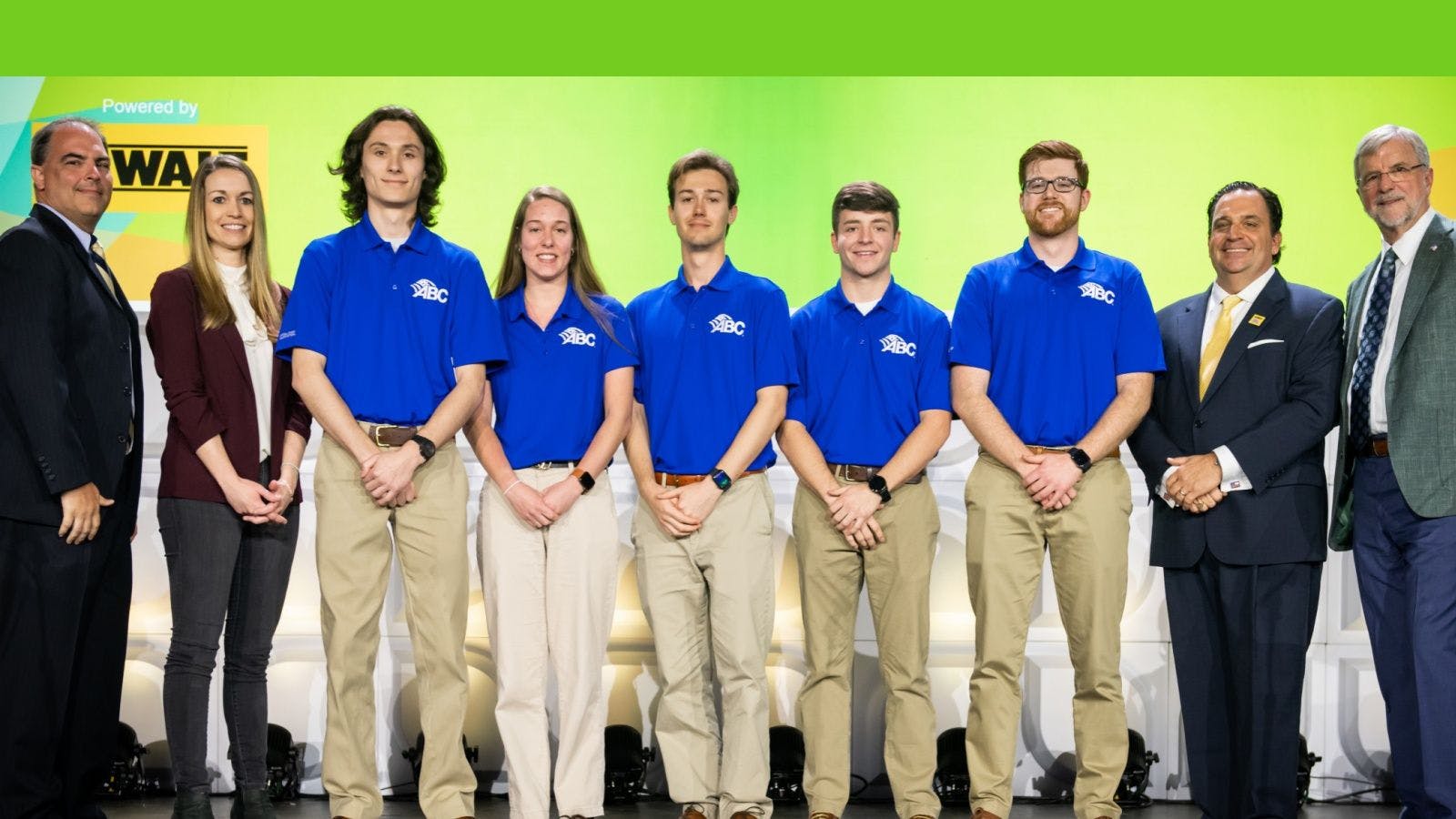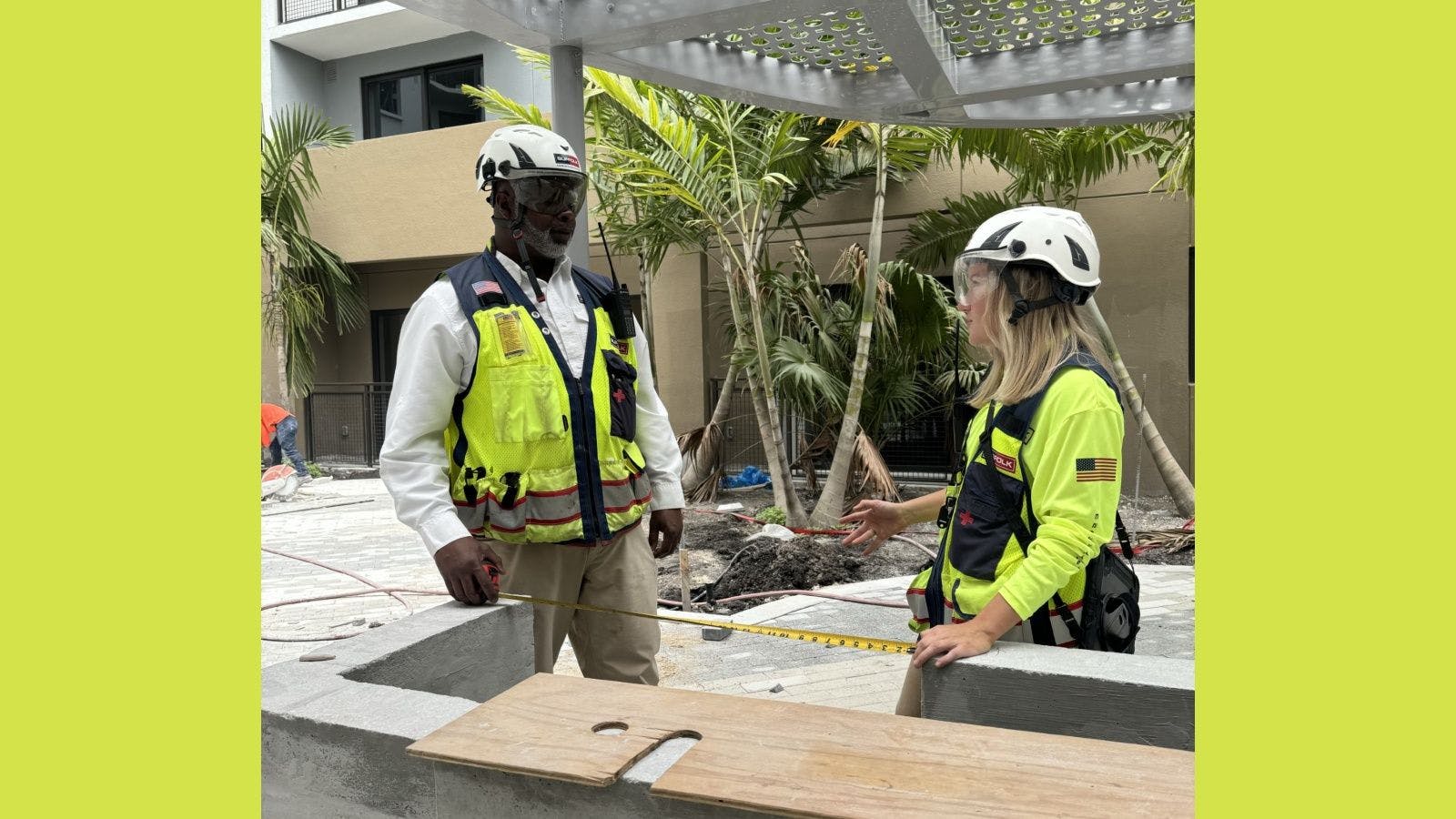
Generation Yes: Recruiting Today’s Construction Management Students
Before Rebecca Barrows started her junior year of high school outside of Houston, she assumed that her next step would be a collegiate architecture program. But a visit to New York City for an architecture camp in the summer of 2018 changed her direction. “We visited a hospital that was under construction, and I loved the thought of working on it more than the thought of staying in an office all day,” Barrows says. “I was interested in the bidding, the estimating and the entire process. It opened a lot of questions for me.”
While she wound up applying primarily to colleges with architecture programs, a tour of the construction-management program at Louisiana State University felt like the perfect fit. She enrolled at LSU and immersed herself fully in the chance to learn more about what her career might look like. For evidence of just how ambitious she was, consider her agenda for LSU’s sophomore interview day, when she met with a head-spinning 14 companies about potential internships. “I could tell within the first few minutes whether it was a company that felt like a good fit,” Barrows says, “or if it wasn’t going to be the right place for me.”

Barrows, who was part of the LSU team that took home Student Chapter of the Year honors at ABC’s 2023 Construction Management Competition, will graduate from LSU this spring. After three internships that have included work on data centers in Albuquerque and Dallas and a hospital at the University of New Mexico, she has an even better idea of what she wants from her career—and what she’ll ask during interview day in late March to narrow down her preferences for where she’ll land after graduation. “I want to talk about the salary, the benefits, if there’s a moving stipend, and if you’ll pay for my relocation to a new jobsite,” Barrows says.
“It’s not just about me, either. I want to know what they love about their company, how long have they been there, and if they have hopped around between different jobs,” Barrows continues. “If I am going to join a company, I want to grow within it and make an impact.”
EARLY AND OFTEN
Barrows and her classmates reflect a sometimes-overlooked aspect of the industry’s talent shortage—i.e., that it doesn’t just exist at the skilled-trades level. According to the Bureau of Labor Statistics, the number of construction-management openings is expected to grow by 5% between 2022 and 2032, to an average of about 38,700 openings each year. That puts even more pressure on companies to figure out how to answer the questions that rising stars like Burrows will pose.
“The number of opportunities per student is far in excess of the number of students we have,” says Wayne Sheppard, department head and assistant professor of construction management at Pennsylvania College of Technology. “Most seniors have multiple offers, with many getting 10 or more. Companies should not wait until they are close to graduating. It’s critical for them to be invested in the program throughout their time here to build long-term relationships with the students and faculty and to get more brand recognition and to showcase their opportunities.”
Gerrad Delatte, professional in residence in the construction-management department at LSU’s College of Engineering, echoes the importance of a student-engagement strategy that begins long before any sort of annual career fair. In fact, he has two words for employers that are looking to connect with top construction talent: “Start early.”
“Become a guest speaker in the classroom, attend student organization meetings and events, hire interns,” Delatte says. “Do whatever you can to get to know them as well as they are getting to know you. We’re all human, and we want to make that personal connection.”
Establishing that kind of connection was one of the key factors in Austin Mader’s decision to accept a role with JE Dunn Construction when he graduates from Clemson University this spring. Mader notes that the company had laid the groundwork by sponsoring resume workshops and offering opportunities to get to know some of its people outside Clemson’s standard job-hunting events.
“Sometimes, the career fair can be such a crazy day with so many students and so many companies,” says Mader, who was part of the Clemson team that finished third overall in the 2023 Construction Management Competition, with first-place finishes for project management and estimating. “So, their work to get involved with the Clemson Construction Science and Management program played a big role in my decision to pursue an internship [and an eventual full-time role] with them.”
CULTURE AND COMMITMENT
Sponsoring workshops and dinners for construction-management majors can lay the foundation for success, but building an effective talent-recruitment strategy requires sharing what they would actually experience as company employees. Mader says that seeing JD Dunn’s close-knit culture during an internship last summer made an even bigger difference in his decision to accept a post-graduate role with the company.
“I was the only intern in San Antonio, and my project team really put in the effort to make sure that I was included,” Mader says. “They didn’t think of me as just the intern but more as the new full-time hire. In meetings, they would ask for my input on certain areas that I might not know much about yet, but they still wanted to hear my thoughts. That meant a lot. Some of them have been doing this for 30 or 40 years, and I’ve been in school for four years.”
The feeling of inclusion extended past the jobsite. “Outside of the actual work, we were part of a weekly sand-volleyball league and spent a lot of time going to restaurants,” Mader says. “The family culture of the company really appealed to me.”
That sense of a family is something on Charles Coleman’s mind, too. Coleman, who will graduate from LSU’s construction-management program at the end of 2024, says that making his post-grad choice—he is currently deciding between two job offers—“comes down to a lot more than dollars.”
“When I’m with a company, I want to know where I am going to be 10 or 15 years down the road,” says Coleman, who like Barrows was a member of LSU’s Student Chapter of the Year team. “Is this the type of team and the atmosphere that I want? I want to be surrounded with other professionals who are going to build me up, and I want to be able to build other people up at the same time to achieve a common goal.”
FLEXIBILITY AND TRAVEL
A plan to stick with a company for the long haul might make this generation sound a lot like baby boomers who were happy to climb the ladder to success at one employer. However, these students have seen how life and work changed during the pandemic, and they’re approaching their careers with a different definition of work-life balance. “COVID really changed the way we work, and the expectations of current students and recent graduates have shifted a bit, too,” Delatte says. “Some of the students have gotten accustomed to more flexibility during their internships. Now, it seems there is a balance of figuring out how to come into the office sometimes and work from home on occasions. It’s very fluid right now in the employee–employer relationship.”
Flexibility is indeed on the minds of aspiring construction executives.
While Barrows says she is “a people person” who wants to be out in the field with colleagues, LSU and other schools’ pivot to remote learning during the pandemic was a reminder of the value of adaptability—something she saw firsthand when she interned with Turner Construction Company on a data-center project in Dallas last summer. “One of the women onsite was a cost engineer, and she worked remote three days a week because she had very young children who were out of school that she needed to take care of,” Barrows says.
“The company was willing to adjust for her needs. It’s very important to have that type of culture for me. I don’t know what the future necessarily holds, but options are great.”
Forward-thinking companies are listening to this new set of needs. Erika Anderson, talent acquisition and development manager for Hensel Phelps, says that part of her aim is to help prospective employees understand the company’s open-door policy for conversations with their supervisors and company leaders. “Life happens, and the work does not stop,” Anderson says.
“When it comes to their personal lives and family needs, we want our people to know they can trust their leaders and share their priorities and values. It’s hard to put that in an offer letter, but we want them to know that we encourage clear and honest conversations.”
In addition to the ability to work from home if necessary, many of tomorrow’s construction leaders are looking for an opportunity to leave home altogether. Noah Jumper, a junior at Pennsylvania College of Technology, has completed two internships—both with the Whiting-Turner Contracting Company—that helped him see the preconstruction phase as well as final closeout of a project. His first internship, which was in northern Kentucky, gave him a sense of one of the things about a construction career that excites him most: a chance to travel.
“I had never been to Kentucky before, and I got to see a new place while learning and growing my knowledge in the construction industry,” says Jumper, a member of Pennsylvania College of Technology’s 2023 CMC team, which finished second in the safety category. “That’s definitely something I want to find when I graduate, too. I want to be able to travel while I’m young and see the United States. I would want to travel internationally if that’s an opportunity, too.”
TECH AND TALKING
The members of this year’s graduating class each have different ideas about what kinds of projects will satisfy their passions, where they want to wind up and how they want to grow as leaders, but there is one common thread that unites all of them: technology. Unlike many of today’s senior leaders who started their careers with physical blueprints, hard-copy project specs, manual processes and calculators, these digital natives have grown up in an age of automation.
“Today’s students are very tech-savvy,” Delatte says. “They know how to utilize computers, and they’re more proficient than ever before with software.”

As an intern, Coleman also worked on a hospital expansion project in Georgia.
And they’re ready to leverage those proficiencies to create real results. “We’ve got new students who are coming into the industry with a lot of knowledge and a lot of capabilities as far as software, people management and production management,” Coleman says. “I’m coming into the industry knowing how to use programs like Revit, AutoCAD and Primavera P6 scheduling software. There is a lot of opportunity to change the industry to be more efficient and more productive.”
However, Sheppard believes it’s important to avoid assuming that technology will do it all. While acknowledging that tools like BIM modeling and 3D scanning are part of the curriculum, he notes that in his classes at Pennsylvania College of Technology, he’s more focused on “developing people skills” with his students.
“The younger generation is getting a lot of technology throughout their life, but that can create some challenges with personal interactions,” Sheppard says. “Part of our role as a teaching school is to make sure they know that texting is not a great way of solving problems. You have to meet face-to-face to hash out problems and come to a solution that hopefully is beneficial for everybody. Technology has pushed many of us to believe that an email or text is going to solve our problems, but that doesn’t work in a jobsite environment.
“Time management, critical thinking, problem solving, conflict resolution—these will always matter on every jobsite,” Sheppard says. “The technology may, but it may not. So, we have to make sure we’re finding a balance integrating technology without losing the core of what every construction manager and superintendent needs to know.”
There is one other key lesson that every aspiring construction manager needs to know: just how promising their future really is. While the industry has faced plenty of challenges in crafting a message about career-growth opportunities, it’s clear that the word is starting to spread. “The sky’s the limit in construction,” Coleman says, reflecting on why anyone considering the career path should feel optimistic about what lies ahead. “There’s so much opportunity. You just have to want it and take it.”
Related stories








